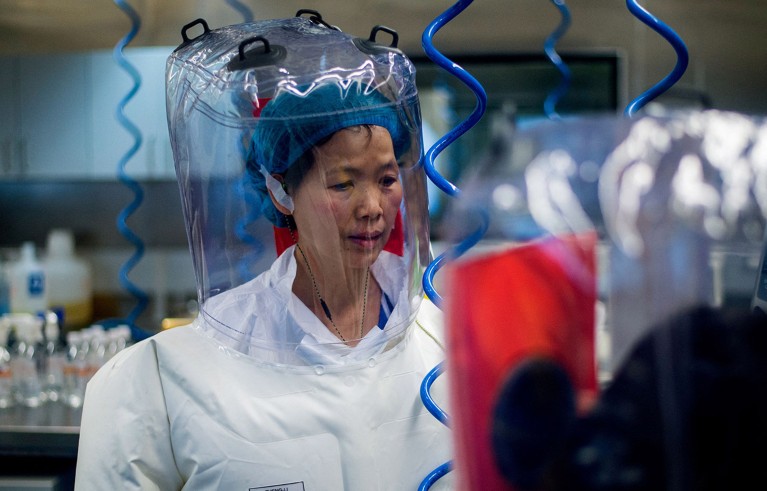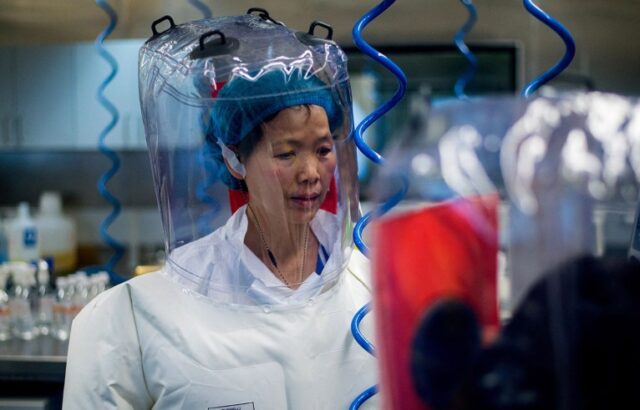Hello Nature readers, would you like to get this Briefing in your inbox free every day? Sign up here.

Chinese virologist Shi Zhengli has presented evidence that her lab has not worked with close relatives of SARS-CoV-2.Credit: Johannes Eisele/AFP via Getty
Shi Zhengli, the virologist at the centre of claims that the virus that causes COVID-19 escaped from a laboratory in Wuhan, has presented data on 56 whole genomes of bat coronaviruses, as well as some partial sequences, stored in her lab’s freezers. Her analysis, presented at a conference in Japan this week, reports that none of those viruses are the most recent ancestors of the virus SARS-CoV-2. “This just validates what she was saying: that she did not have anything extremely closely related, as we’ve seen in the years since,” says evolutionary biologist Jonathan Pekar.
Nature | 4 min read
A 74-year-old Laysan albatross with as many as 30 offspring is trying for another. The Phoebastria immutabilis, dubbed ‘Wisdom’, nests on the Midway Atoll National Wildlife Refuge, alongside nearly 70% of all Laysan albatrosses. She was first ringed as an adult in 1956 by legendary ornithologist Chandler Robbins and is now the world’s oldest known banded bird in the wild.
Associated Press | 2 min read
Features & opinion
It will be no mean feat to bring the International Space Station (ISS) — the biggest orbiting object made by people — back down to Earth in 2031. Last year, NASA announced that SpaceX will design a vehicle to ‘deorbit’ the whole station at once — probably into an area known as the South Pacific Oceanic Uninhabited Area. Even seven years in advance, activists and researchers are concerned that the potential air and water pollution associated with the station’s reentry are being ignored.
Space.com | 9 min read
A Human Support Intelligence learns to tell its own story in Exis memoria and a time-traveller cracks a mystery that’s haunted him for decades in Loose ends.
Nature | 6 min read & Nature | 6 min read
Breast cancer cells in mice are more susceptible to chemotherapy at certain points in the menstrual cycle, when progesterone levels are low. The same effect was shown in people in a small retrospective study. “It may not be so much a direct impact of the hormones on the cancer cells,” cancer biologist Colinda Scheele tells the Nature Podcast. “It more impacts the tumour microenvironment, which then in turn impacts on the cancer cells.”
Nature Podcast | 30 min listen
Subscribe to the Nature Podcast on Apple Podcasts, Spotify or YouTube Music, or use the RSS feed.
Today Leif Penguinson is enjoying a spot of rock hopping on a stone run in East Falkland, Falkland Islands. Can you find the penguin?
The answer will be in Monday’s e-mail, all thanks to Briefing photo editor and penguin wrangler Tom Houghton.
This newsletter is always evolving — tell us what you think! Please send your feedback to [email protected].
Flora Graham, senior editor, Nature Briefing
With contributions by Jacob Smith
Want more? Sign up to our other free Nature Briefing newsletters:
• Nature Briefing: Careers — insights, advice and award-winning journalism to help you optimize your working life
• Nature Briefing: Microbiology — the most abundant living entities on our planet — microorganisms — and the role they play in health, the environment and food systems
• Nature Briefing: Anthropocene — climate change, biodiversity, sustainability and geoengineering
• Nature Briefing: AI & Robotics — 100% written by humans, of course
• Nature Briefing: Cancer — a weekly newsletter written with cancer researchers in mind
• Nature Briefing: Translational Research — covers biotechnology, drug discovery and pharma






